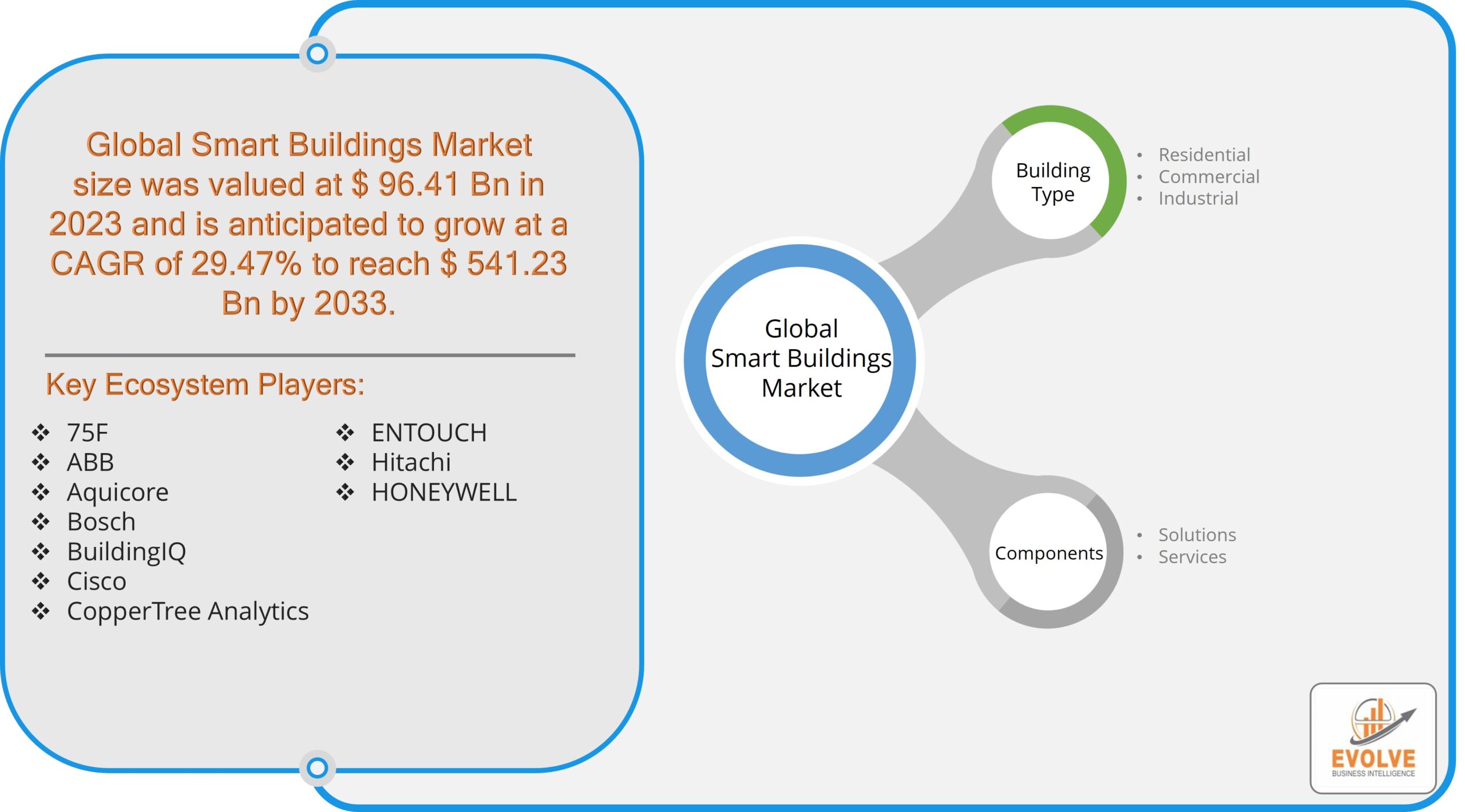Blog
Smart Buildings Market Is Estimated To Record a CAGR of Around 29.47%

Evolve Business Intelligence has published a research report on the Global Smart Buildings Market, 2023–2033. The global Smart Buildings market is projected to exhibit a CAGR of around 29.47%during the forecast period of 2023 to 2033.
Evolve Business Intelligence has recognized the following companies as the key players in the global Smart Buildings Market: 75F, ABB, Aquicore, Bosch, BuildingIQ, Cisco, CopperTree Analytics, ENTOUCH, Hitachi, HONEYWELL.
For More Information: https://evolvebi.com/report/smart-buildings-market-analysis/
Smart Buildings Market Highlights
The Global Smart Buildings market is projected to be valued at USD 541.23 Billion by 2033, recording a CAGR of around 29.47% during the forecast period. The smart buildings market refers to the sector focused on the development and integration of advanced technologies within building infrastructures to enhance their efficiency, sustainability, and functionality. Smart buildings leverage IoT devices, automation systems, and data analytics to optimize energy usage, improve security, and enhance the comfort and productivity of occupants. Key components include smart lighting, HVAC systems, energy management systems, and advanced building management software. The market is driven by increasing urbanization, the need for energy efficiency, and the growing emphasis on sustainable development practices.
The COVID-19 pandemic has led to supply chain disruptions leading to supply shortages or lower demand in the Smart Buildings market. The travel restrictions and social-distancing measures have resulted in a sharp drop in consumer and business spending and this pattern is to continue for some time. The end-user trend and preferences have changed due to the pandemic and have resulted in manufacturers, developers, and service providers adopting various strategies to stabilize the company.
Segmental Analysis
The global Smart Buildings market has been segmented based on Building Type, Component
Based on Building Type, the market is segmented based on Residential, Commercial, Industrial. the Commercial segment typically dominates. This is driven by the widespread adoption of smart technologies in office buildings, retail spaces, and hospitality sectors, where efficiency, sustainability, and enhanced occupant experience are crucial.
Based on Components, the market has been divided into Solutions and Services. These encompass hardware and software technologies such as IoT devices, building management systems, and energy management platforms. Services, which include consulting, integration, and maintenance, complement these solutions to ensure optimal performance and integration within building infrastructures.
For More Information: https://evolvebi.com/report/smart-buildings-market-analysis/
Regional Analysis
The Smart Buildings market is divided into five regions: North America, Europe, Asia-Pacific, South America, and the Middle East, &Africa. North America holds a dominant position in the Smart Buildings Market. America is made up of the US, Canada, and Mexico. In the area, smart building technologies are being adopted and deployed more regularly. A significant amount of the market share in North America can be attributed to the high number of early adopters in the US and Canada. The area is expected to lead the global market during the course of the forecast due to its developed infrastructure, which can support smart automation solutions in both the residential and commercial segments. The Asia-Pacific region has indeed emerged as the fastest-growing market for the Smart Buildings industry. The companies operating in the Asia Pacific market additionally hope to enhance smart building services by developing IoT-enabled building management systems across the region. Japan, China, and India are key participants in the advancement of regional technology.



